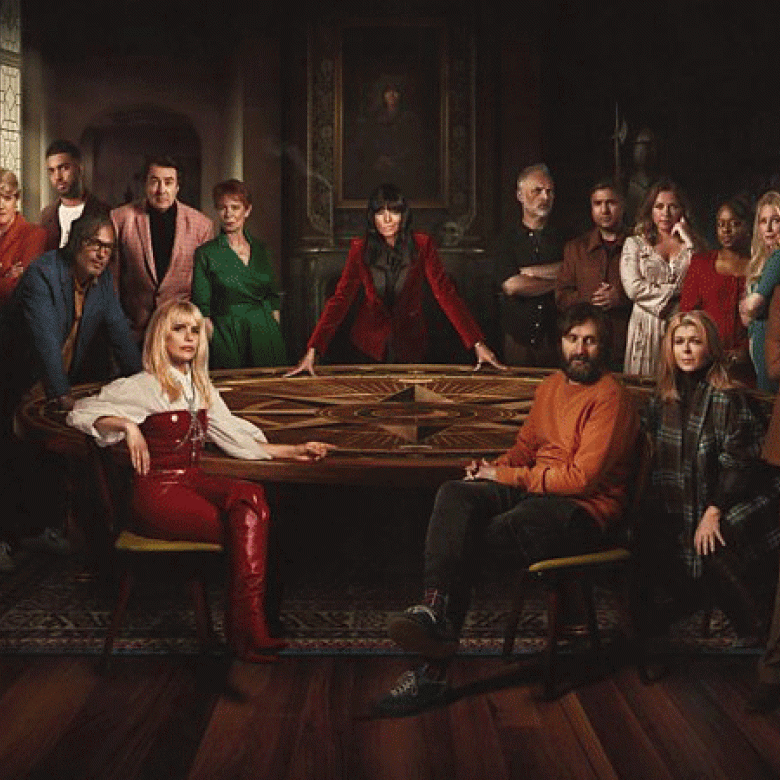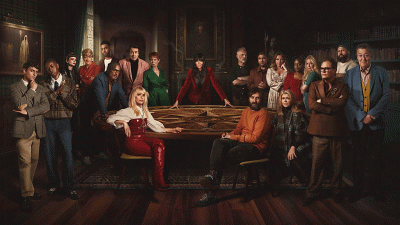Playing the Game: What Celebrity Traitors reveals about strategy, authenticity and the self
16 October 2025

This article has been written by Dr Douglas Brown, Dean of the Faculty of Screen, Technology & Performance.
When The Traitors first appeared on television, few could have imagined that a game once played in tech-conference coffee breaks would become one of the defining formats of modern reality TV. Its roots lie in a Russian social-deduction game from the 80’s called Mafia where a large team of normal players must unmask a small number of better informed, hidden saboteurs, which later evolved into the popular card game Werewolf and, eventually, The Traitors.
In each version the same central tension endures: who can you trust when everyone might be lying, and how can you identify liars through nonverbal communication? The celebrity version of The Traitors takes this premise into new territory.
For the celebrity players, it isn’t just about winning a game; it’s about negotiating the complex overlap between performance, reputation and selfhood. Their success depends not simply on cunning strategy but on their ability to manage how they are seen by other contestants and by millions of viewers beyond the castle walls.
One of the joys of watching The Traitors is the playing from the comfort of our sofas, with a cup of tea and biscuit in hand.
The Traitors is a social endeavour first and foremost. Regardless of role, the smartest move is to make friends, build trust and resist the urge to present yourself as an authority. Authority figures go down quickly – we all remember how the doctor in season two was re-imagined as someone who ‘saves lives by day, but murders by night’ based on no evidence at all. Set yourself up as an expert, and you’ll be first in the firing line.
This is frustrating for the Faithful team, because the advantage they have through strength in numbers can only be used if they get organised. Traitors' voting patterns will betray them in the long-term, but someone trusted needs to be keeping count. The only advantage the traitors have is knowledge.
The real contest lies in using emotional quotient (EQ) to manage how others perceive your motives and emotions, not IQ to master the rules. This is known as emergent gameplay.
Four ways of playing a game
When designing games, it is helpful to think about the four ‘Bartle’ player types, classically imagined as the four suits of cards: Socialisers (Hearts), Achievers (Diamonds), Explorers (Spades) and Killers (Clubs).
Socialisers play for the pleasure of connection. They don’t care whether they win or lose, only that they have a positive emotional experience. Achievers, by contrast, live for victory and want to understand and optimise the system. Explorers delight in discovery; they’ll happily come last if they uncover an ingenious new tactic along the way. Killers are the archetypal traitors: they thrive on domination, on beating others and bending the system to their will, ideally winning as well, but definitely having a high body count.
In the celebrity version, these types collide in especially vivid ways. It is fair to see many celebrities as natural socialisers, performers who draw energy from interaction and charm but they often possess the Achiever’s drive and, occasionally, the Killer’s competitive streak. The result is a volatile mix: people accustomed to curating their image forced into a space where deceit is sanctioned and sincerity is suspect.

Sanctioned betrayal
This, to me, is the enduring power of The Traitors and its forebears. Games like Werewolf allow us to behave in ways that would be socially unacceptable elsewhere. They sanction betrayal. They let us backstab and manipulate without consequence.
In real life, if I undermined a colleague in a meeting, we’d struggle to have a drink together afterwards; in a game, we can do it guilt-free.
That same logic drives the television version. The Traitors is theatre — a safe stage for transgression. Yet for famous contestants, that safety net frays. The parasocial relationships that audiences form with celebrities complicate every move. We think we know Alan Carr, or Stephen Fry, or any public figure we’ve grown up watching. When they enter the castle, they carry all those associations with them.
Managing that relationship may matter more to them than winning for their charity. Playing up to those qualifiers — wit, charm, sincerity — is part of their ongoing brand maintenance. A celebrity traitor who behaves too ruthlessly risks damaging the parasocial bond that keeps audiences invested in them. Hold back too much, and you lose the game.
But as Alan Carr noted in the opening episode, they are celebrities and they - and quite probably the public - expect each other to stab them in the back!
Three selves in play
Each contestant must therefore juggle three selves: the true self (the private individual), the gamer self (the strategist seeking the right move to make) and the public self (the persona that sustains their career). The most compelling moments on screen will likely occur when those three selves collide. When the balancing act becomes too much and the mask slips, or when someone’s genuine decency undermines their strategic sense.
The ability to continually command attention may have increasingly driven the media economy in recent years, but as we become ever more media literate the ability to project a believable, coherent self across multiple contexts is increasingly a currency those in the public eye want to use to connect.
In The Traitors, contestants will likely have awareness of the need to negotiate their authenticity in real time, all while knowing that every smirk, side-eye and act of betrayal will be turned into a meme within minutes of being broadcast.
From ice-breaker to crucible
From its roots in Russian psychology departments, Mafia spread like a meme, becoming a way for strangers to connect, show strategic flair and learn something about one another quickly. In that sense, the show’s producers have merely amplified what was always there: a social mirror that reveals who we become when trust is in short supply.
What Celebrity Traitors adds is a final twist of irony. The players already live in a world where every interaction is mediated — by PR teams, social media algorithms, production companies and publicists. Here, they are mediated once more, this time by the rules of a game that rewards duplicity while promising authenticity. It’s no wonder viewers find it irresistible.
Every game mechanic is, in the end, a metaphor. The traitor mechanic — the betrayal, the whispered alliance, the final reveal — speaks to much more than winning or losing. It explores what makes power shift, how alliances form and fracture and how identity survives under scrutiny. The Traitors simply brings that timeless drama into high definition.
About Dr Douglas Brown
Dr Douglas Brown is the Dean of the Faculty of Screen, Technology & Performance at Falmouth University. With industry experience at Square Enix on titles including the award-winning Final Fantasy XII, Douglas brings both creative and academic insight to games education. His research explores how players engage with stories and worlds, focusing on game theory, game design, and narrative in games. He has published work on game analysis, MMO-RPG design, and franchise adaptation, and is currently writing a book on ‘suspension of disbelief’ in games.
Image credit: (Image: BBC/Studio Lambert/Cody Burridge/Artwork - BBC Creative)




